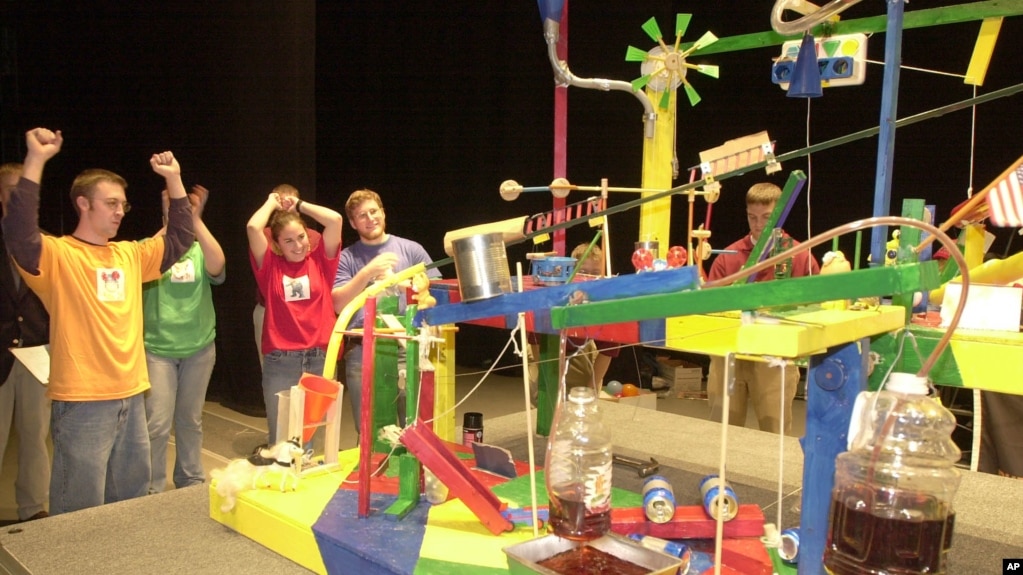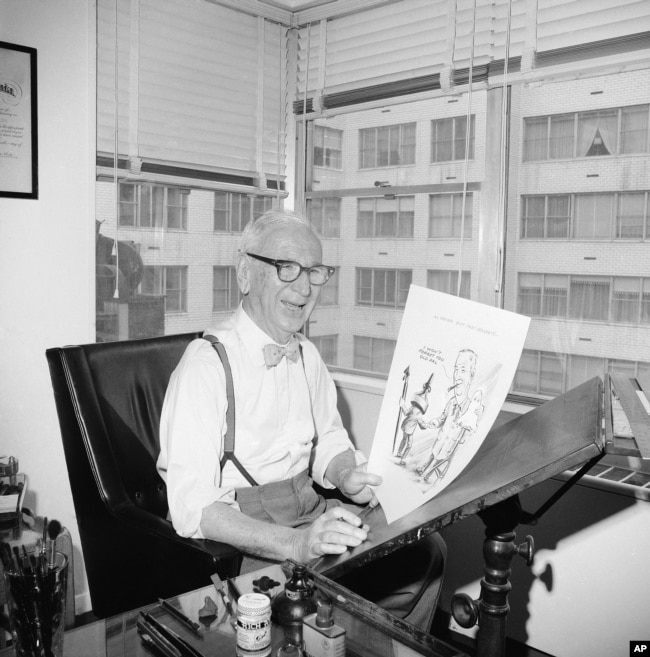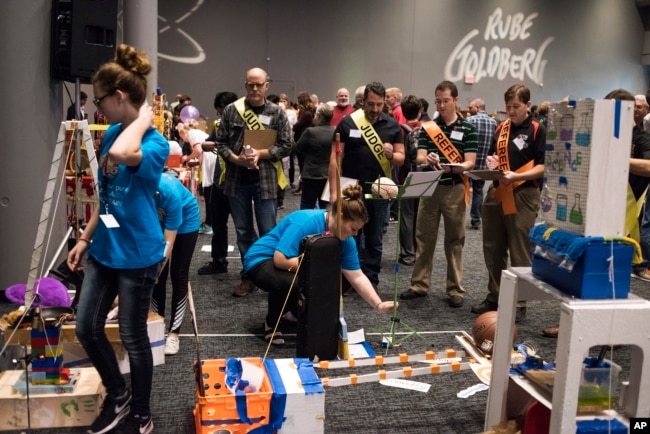
Parents around the world often urge children over and over – wash your hands!
This advice was already common before the coronavirus crisis. Now there is added pressure on children – as well as adults – to wash their hands even more.
It can be difficult, however, to get children to remember to wash and many are likely to resist.
But what if washing hands was connected to a fun, creative activity? What if instead of simply reaching for the soap, a machine could drop it right into your hands?
Well, such a machine was recently built by a boy and his sister in the U.S. state of Maryland as part of a creative competition. The not-for-profit Rube Goldberg organization is holding the competition.
Rube Goldberg was an American cartoonist, engineer and inventor – among other things. He was known for his complex chain reaction machines.

Cartoonist Rube Goldberg, 81, is shown in his New York City apartment, April 24, 1964 after he completed his last cartoon.
On the organization’s website, Goldberg’s granddaughter Jennifer George describes such a machine as an overly complex “wacky contraption that in the end does a very simple task.”
Every year, the Rube Goldberg competition considers inventions made from everyday items that use complex systems to carry out a simple task.
At first, the task for 2020 was supposed to be “turn on a light.” But when the coronavirus pandemic happened, the task was changed to “drop a bar of soap into someone’s hand.” Here are some tasks from past competitions:
- open an umbrella
- water a plant
- make a cup of coffee
- turn on a radio
The task is not the only thing that has changed this year because of the pandemic.
Most of those taking part in the competition are schoolchildren. In past years, they created the machines in person and on teams at school. But with schools closed to slow the spread of the virus, organizers changed the rules. This year, the team can include any family members or “quarantined groups.” People were asked to send in videos of the machines to compete.

Syracuse Junior High School Mesa Club from Syracuse, Utah shows how their machine "A Day in the Life of a Student" completes the task of applying a BAND-AID bandage at the Rube Goldberg Machine Contest, 2017.
One thing has not changed: The machine must complete the task in 10 to 20 steps.
In Maryland, the Diel family wanted to enter. So, 11-year-old Caitlin and her 13-year-old brother Ben designed and built their own Rube Goldberg machine. Next, they had to demonstrate that it could complete the task – throwing the soap just right to be caught in someone’s hand.
Dressed in her bathing suit, Caitlin waited in the shower as Ben started the chain-reaction machine from the other end. Here are some of the steps they used.
First, a marble dropped into a tube. That sent a toy train speeding to hit a deodorant stick. The deodorant stick went flying into a stuffed toy animal – a rabbit. The toy rabbit then raced along a zip line to shoot a bar of soap.
After six hours and 106 failed attempts – they finally had success – the soap dropped right into Caitlin’s waiting hands. With their video demonstration, they can now enter the competition.
Ben said that remembering all the times he and his family spent building the machine together had made “great memories.” Caitlin said now when she hears “wash your hands,” she thinks of the Rube Goldberg machine that drew her family together.
Jennifer George said this year’s competition was designed in part to keep families busy and active during long-term stay-at-home orders. The program also aims to teach important lessons with creativity, artistic expression and just plain fun, she added.
As the United States and other countries begin slowly reopening, health experts say hand washing remains an important protection against the coronavirus.
However, if children are thinking about a deadly virus each time they wash their hands, mental health experts say they may feel afraid. So, a fun competition may help to create good feelings about a task they must do over and over again.
Dr. Anne Glowinski teaches child psychiatry at Washington University School of Medicine in St. Louis. She told the Reuters news agency that “creativity and play” connects with children. It is better than the message, “we have to wash our hands because of this horrible virus,” Glowinski added.
But if you do not have the time to make a Rube Goldberg machine, singing a song during handwashing is fun too!
So far, the Rube Goldberg competition has drawn more than 200 entries worldwide. Winners are to be announced on June 7.
People creating the best and strangest machines will receive Rube Goldberg gift bags. The bags include books, water bottles, light-up hats and other fun items.
Words in This Story
chain reaction – n. a series of events in which each event causes the next one : a series of events caused by one single event
cartoonist – n. a person who draws pictures (as in a newspaper) making people or objects look funny or foolish
wacky – informal adj. amusing and very strange
contraption – n. a piece of equipment o r machinery that is unusual or strange
quarantine – n. the period of time during which a person or animal that has a disease or that might have a disease is kept away from others to prevent the disease from spreading
shower – n. a bath in which water is sprayed on the body or a device for providing such a bath
marble – n. a little ball made of a hard substance (such as glass) and used in various games
deodorant stick – n. a product used to remove or hide unpleasant odors
zip line – n. a cable suspended above an incline to which a pulley and harness are attached for a ride
psychiatry – n. a branch of medicine that deals with mental, emotional, or behavioral disorders